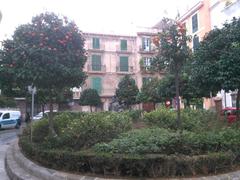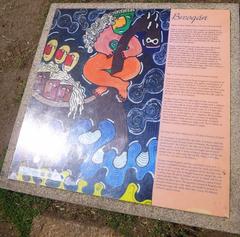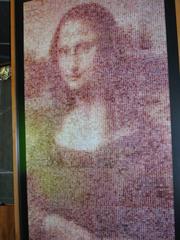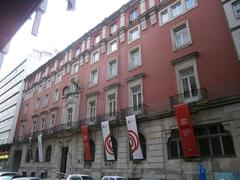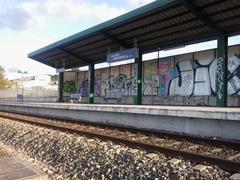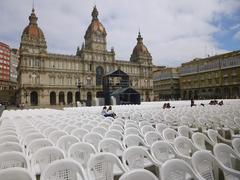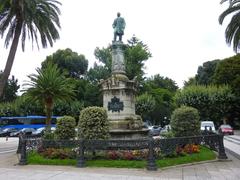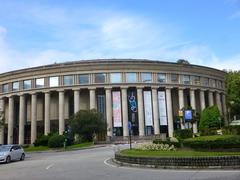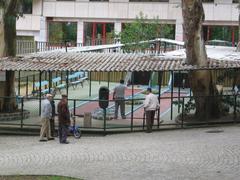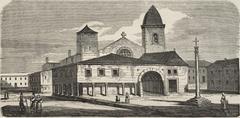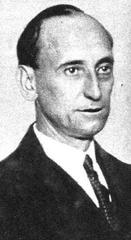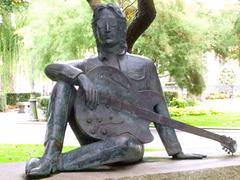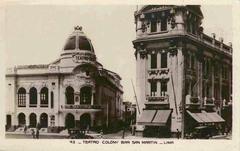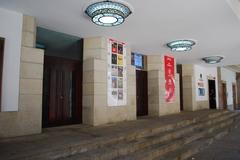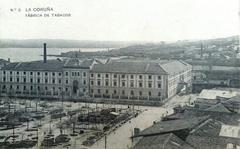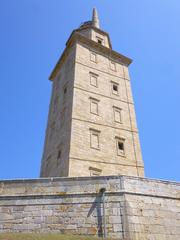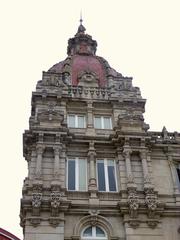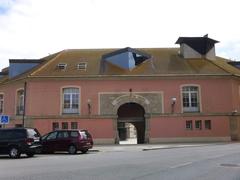
Méndez Núñez Garden: Comprehensive Visiting Hours, Tickets, and Travel Guide for A Coruña Historical Sites
Date: 04/07/2025
Introduction: Discovering Méndez Núñez Garden’s Significance in A Coruña
Located in the vibrant center of A Coruña, Spain, Méndez Núñez Garden is a living testament to the city’s dynamic history, maritime legacy, and cultural richness. Established in the mid-19th century on reclaimed land from the sea, it transformed what was once the city’s defensive barrier into an inclusive public green space. Named after the esteemed Galician naval officer Casto Méndez Núñez, the garden now serves as both a tranquil urban retreat and a site of deep historical and artistic resonance.
Visitors can stroll beneath grand avenues of Canary Island palms, admire the intricate floral clock, and encounter statues honoring Galician luminaries such as Emilia Pardo Bazán and Curros Enríquez. Level pathways, free admission, and a central location ensure accessibility for all, while frequent community events and festivals make the space a vibrant cultural hub. Whether you are passionate about history, botany, or local traditions, this detailed guide provides all essential information regarding visiting hours, tickets, accessibility, nearby attractions, and travel tips to help you make the most of your visit (VisitCoruna.com; Paxinas Galegas; Wikipedia).
Table of Contents
- Historical Overview and Evolution
- Main Features and Artistic Heritage
- Visitor Information: Hours, Tickets, Accessibility
- Garden Layout and Highlights
- Events, Community Life, and Social Impact
- Nearby Attractions and Travel Tips
- Frequently Asked Questions (FAQ)
- Plan Your Visit: Summary and Resources
Historical Overview and Evolution
Origins and Development
The transformation of A Coruña’s cityscape in the mid-1800s led to the garden’s creation on land reclaimed from the sea after the city’s old walls were demolished. This initiative was part of “El Relleno,” a substantial urban reform that replaced defensive structures with spaces for public life. In 1868, under the direction of Narciso García de la Torre, the garden’s construction began, with its official naming as “Paseo de Méndez Núñez” following in 1871 to honor the naval hero (VisitCoruna.com).
Expansion and Modernization
Initially extending between Avenida de la Marina and Plaza de Mina, the gardens expanded to include the Rosaleda (rose garden) and notable architectural elements like the Palco de la Música and Kiosco Alfonso. The 20th century saw further adaptation, including the addition of a floral clock and calendar, and a major restoration in the 1980s focused on accessibility and preservation, earning regional architectural awards.
Main Features and Artistic Heritage
Monuments and Sculptures
Méndez Núñez Garden is renowned for its rich array of monuments celebrating Galician culture and identity:
- Emilia Pardo Bazán: A prominent statue by Lorenzo Coullaut Varela honors this influential feminist writer.
- Curros Enríquez: Francisco Asorey’s granite monument, resembling a ship’s prow, features the poet with manuscripts and a harp.
- Eduardo Pondal and Other Luminaries: Additional busts and sculptures commemorate figures like Manuel Murguía, Juan Fernández Latorre, and Aureliano Linares Rivas (Wikipedia).
The gardens also feature modern tributes, such as a monument to John Lennon, as well as botanical rarities and mature trees spanning ombú, ginkgo, and Brazilian palms.
Architectural Highlights
- Kiosco Alfonso: A striking modernist pavilion hosting art exhibitions, literature festivals, and civic events (Wikipedia).
- Palco de la Música: A historic bandstand, faithful to its 19th-century design, serves as the venue for open-air concerts and public performances.
- La Terraza: An iconic early 20th-century building, originally a seaside café, now part of the garden’s architectural landscape.
Visitor Information: Hours, Tickets, Accessibility
Opening Hours
- Garden: Open daily, generally from 8:00 AM to 10:00 PM. Hours may adjust during special events or holidays; check the official tourism site for updates.
- Kiosco Alfonso Pavilion: Open 12:00–14:00 and 18:00–21:00, featuring free rotating exhibitions (VisitCoruna).
Admission and Tickets
- Garden: Free entry for all visitors; no tickets required.
- Events and Guided Tours: Some special events or guided tours may require advance registration or tickets (Paxinas Galegas).
Accessibility
- Level, paved walkways throughout, accessible for wheelchair users and strollers.
- Accessible public restrooms and multiple entrances from surrounding streets.
- Designated parking nearby; public transit stops within walking distance (Sapos y Princesas).
Garden Layout and Highlights
Key Zones
- Paseo de Palmeras: A dramatic palm-lined avenue ideal for strolls and photos.
- Central Arboreal Mass: Densely planted with diverse species, featuring the garden’s floral clock and living calendar.
- Rosaleda (Rose Garden): Home to over 4,000 rose varieties, peaking in spring and early summer (Escapalandia).
Facilities
- Children’s Playground: Updated play area with equipment for all ages.
- Cafés: Notable spots include Copacabana Café and Café Atalaya, offering refreshments and shaded terraces.
- Seating and Water Fountains: Benches and fountains are distributed throughout for comfort and convenience.
Events, Community Life, and Social Impact
Cultural Events
Méndez Núñez Garden is a focal point for events such as:
- Día das Letras Galegas: Celebrating Galician literature and arts with music and dance (Quincemil).
- Art Exhibitions: Hosted at Kiosco Alfonso, including the “Viñetas desde o Atlántico” comic festival.
- Seasonal Festivals: Fairs and open-air performances throughout the year (El Ideal Gallego).
Social and Political Expression
The gardens also serve as a venue for civic engagement. Recent peaceful demonstrations and artistic installations, such as banners supporting social causes, highlight the space’s role as a platform for community dialogue (La Opinión A Coruña).
Nearby Attractions and Travel Tips
Historical Sites within Walking Distance
- María Pita Square: City’s central plaza and home to the Town Hall.
- Torre de Hércules: UNESCO-listed Roman lighthouse.
- Museo de Bellas Artes: Showcasing regional and national art.
- Finisterrae Aquarium, Domus Interactive Museum, House of Sciences: Family-friendly attractions (Tropter).
Practical Travel Tips
- Best Times to Visit: Spring and early summer feature peak floral displays; early morning and late afternoon provide the most pleasant atmosphere (Wanderlog).
- Weather: Prepare for variable Atlantic weather—carry an umbrella or raincoat.
- Family-Friendly: Playground, open lawns, and nearby cafés cater to all ages.
- Pets: Dogs on leashes are allowed; owners must clean up after them.
- Photography: Permitted throughout the gardens.
Frequently Asked Questions (FAQ)
Q: What are the opening hours of Méndez Núñez Garden?
A: Open daily from 8:00 AM to 10:00 PM; check official sources for seasonal or event changes.
Q: Is there an entrance fee?
A: No, entrance is free.
Q: Are pets allowed?
A: Yes, pets must be leashed.
Q: Are guided tours available?
A: Yes, during festivals or by arrangement; check with local tourism offices.
Q: Is the garden accessible for visitors with disabilities?
A: Yes, the garden is fully accessible with level paths and adapted restrooms.
Q: Are there public restrooms?
A: Yes, accessible toilets are available on-site.
Plan Your Visit: Summary and Resources
Méndez Núñez Garden embodies the fusion of history, culture, and nature at the heart of A Coruña. Its origins on reclaimed land, rich artistic legacy, and role as a community gathering place make it an essential stop for visitors seeking to experience the city’s spirit. Free admission, accessible facilities, and a central location ensure that everyone can enjoy its botanical, architectural, and cultural wonders.
To enhance your visit:
- Check official websites for current hours, events, and guided tour availability.
- Explore nearby attractions like the Torre de Hércules and María Pita Square.
- Download the Audiala app for audio guides and updated event information.
- Respect local customs—enjoy a coffee on a terrace, attend a festival, and engage with the city’s living heritage.
References
- VisitCoruna.com
- Paxinas Galegas
- Wikipedia
- Quincemil
- Tropter
- Sapos y Princesas
- Ayuntamiento de A Coruña
- Escapalandia
- La Opinión A Coruña
- Wanderlog









